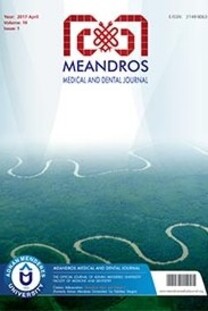Paranasal Manifestations of Early Stage Chronic Lymphocytic Leukemia
Erken Evre Kronik Lenfositik Löseminin Paranazal Belirtileri
___
- Furman RR, Asgary Z, Mascarenhas JO, Liou HC, Schattner EJ. Modulation of NF-kappa B activity and apoptosis in chronic lymphocytic leukemia B cells. J Immunol 2000; 164: 2200-06. [CrossRef]
- Johnston R, Altman KW, Gartenhaus RB. Chronic lymphocytic leukemia manifesting in the paranasal sinuses. Otolaryngol Head Neck Surg 2002; 127: 582-4. [CrossRef]
- Pagedar NA, Halfdanarson TR, Karnell LH, Hoffman HT, Funk GF. Upper aerodigestive tract cancer in patients with chronic lymphocytic leuke- mia: incidence, stage, and outcome. Arch Otolaryngol Head Neck Surg 2012; 138: 1171-5. [CrossRef]
- Richmond A. Nf-kappa B, chemokine gene transcription and tumour growth. Nat Rev Immunol 2002; 2: 664-74. [CrossRef]
- Turco MC, Romano MF, Petrella A, Bisogni R, Tassone P, Venuta S. NF-?B/ Rel-mediated regulation of apoptosis in hematologic malignancies and normal hematopoietic progenitors. Leukemia 2004;18:11-7. [CrossRef]
- Gasparini C, Celeghini C, Monasta L, Zauli G. NF-?B pathways in hemato- logical malignancies. Cell Mol Life Sci 2014;71:2083-02. [CrossRef]
- Batikhan H, Gokcan MK, Beder E, Akar N, Ozturk A, Gerceker M. Associ- ation of the tumor necrosis factor-alpha -308 G/A polymorphism with nasal polyposis. Eur Arch Otorhinolaryngol 2010;267:903-8. [CrossRef]
- Ohori J, Ushikai M, Sun D, et al. TNF-alpha upregulates VCAM-1 and NF-kappaB in fibroblasts from nasal polyps. Auris Nasus Larynx 2007; 34: 177-83. [CrossRef]
- Wang Z, Zhang Q, Li Y, Li P, Zhang G, Li Y. Involvement of mitogen-acti- vated protein kinases and nuclear factor kappa B pathways in signaling COX-2 expression in chronic rhinosinusitis. Inflamm Res 2009; 58: 649-58. [CrossRef]
- Valencia X, Stephens G, Goldbach-Mansky R, Wilson M, Shevach EM, Lipsky PE. TNF downmodulates the function of human CD4+CD25hi T-regulatory cells. Blood 2006; 108: 253-61. [CrossRef]
- Wang SZ, Ma FM, Zhao JD. Expressions of nuclear factor-kappa B p50 and p65 and their significance in the up-regulation of intercellular cell adhe- sion molecule-1 mRNA in the nasal mucosa of allergic rhinitis patients. Eur Arch Otorhinolaryngol 2013; 270: 1329-34. [CrossRef]
- Pagedar NA, Halfdanarson TR, Karnell LH, Hoffman HT, Funk GF. Upper aerodigestive tract cancer in patients with chronic lymphocytic leuke- mia: incidence, stage, and outcome. Arch Otolaryngol Head Neck Surg 2012; 138: 1171-5. [CrossRef]
- Wong RJ, Gliklich RE, Rubin PA, Goodman M. Bilateral nasolacrimal duct obstruction managed with endoscopic techniques. Arch Otolaryng Head Neck Surg 1998; 124: 703-6. [CrossRef]
- Munro S, Brownstein S, Jordan DR, Mcleish W. Nasolacrimal obstruction in two patients with chronic lymphocytic leukemia.Can J Opthalmol 1994; 29: 137-40.
- Lund VJ, Mackay IS. Staging in rhinosinusitis. Rhinology 1993; 31: 183-4.
- Rozman C, Montserrat E. Chronic lymphocytic leukemia. N Engl J Med 1995; 333: 1052-7. [CrossRef]
- Morrison VA. The infectious complications of chronic lymphocytic leuke- mia. Semin Oncol 1998; 25: 98-106.
- Baldwin AS Jr. The NF-kappa B and I kappa B proteins: new discoveries and insights. Annu Rev Immunol 1996; 14: 649-83. [CrossRef]
- Li Q, Verma IM. NF-kB regulation in the immun system. Nat Rev Immunol 2002; 2: 725-34. [CrossRef]
- Gasparini C, Celeghini C, Monasta L, Zauli G. NF-?B pathways in hemato- logical malignancies. Cell Mol Life Sci 2014; 71: 2083-102. [CrossRef]
- Karosi T, Csomor P, Sziklai I. Tumor necrosis factor-? receptor expression correlates with mucosal changes and biofilm presence in chronic rhinosi- nusitis with nasal polyposis. Laryngoscope 2012; 122: 504-10. [CrossRef]
- Valera FC, Umezawa K, Brassesco MS, et al. Suppression of inflammatory cytokine secretion by an NF-?B inhibitor DHMEQ in nasal polyps fibro- blasts. Cell Physiol Biochem 2012; 30: 13-22. [CrossRef]
- Ferrajoli A, Keating MJ, Manshouri T, et al. The clinical significance of tu- mor necrosis factor-alpha plasma level in patients having chronic lym- phocytic leukemia. Blood 2002; 100: 1215-9.
- ISSN: 2149-9063
- Yayın Aralığı: 4
- Başlangıç: 2000
- Yayıncı: Aydın Adnan Menderes Üniversitesi
Tinnitus ve Suisit: Olgu sunumu
Serhan DERİN, Halil BEYDİLLİ, ETHEM ACAR, Murat ŞAHAN, Leyla ŞAHAN
SEVCAN KARAKOÇ DEMİRKAYA, HATİCE AKSU, Nevzat YILMAZ, Börte GÜRBÜZ ÖZGÜR, ESRA EREN, Sibel Nur AVCİL
Paranasal Manifestations of Early Stage Chronic Lymphocytic Leukemia
Ceren GÜNEL, İrfan YAVAŞOĞLU, İBRAHİM METEOĞLU, Ali TOKA, Nihan ALKIŞ
Nadir Bir Olgu Sunumu: İnce Bağırsak Yerleşimli Dev Anjiyomiyolipom
Sevilay GÜRCAN, İBRAHİM METEOĞLU, Uğur AÇIKALIN, Nesibe Kahraman ÇETİN, Pars TUNÇYÜREK
MEVLÜT TÜRE, İMRAN KURT ÖMÜRLÜ, Merve CENGİZ, Can TÜRKİŞ
Anatomi Alanında 2000-2014 Yılları Arasında Türkiye'de Yapılan Bilimsel Yayınlar
Ayfer Metin TELLİOĞLU, Sacide KARAKAŞ, Ayşe Gizem POLAT
Subaksiyal Servikal Bölge Travmalarında Cerrahi Yönetimi: Olgu Sunumu
HASAN EMRE AYDIN, ZÜHTÜ ÖZBEK, Murat VURAL, ALİ ARSLANTAŞ
